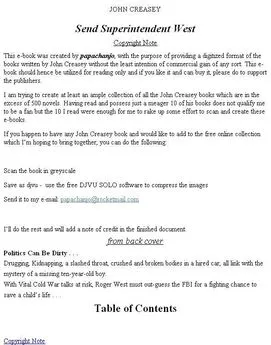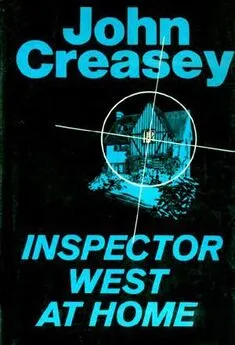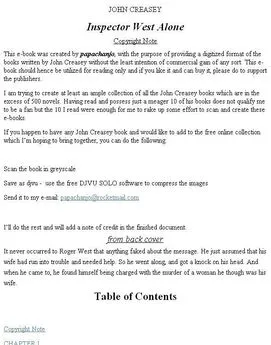John Creasey - Send Superintendent West
- Название:Send Superintendent West
- Автор:
- Жанр:
- Издательство:неизвестно
- Год:неизвестен
- ISBN:нет данных
- Рейтинг:
- Избранное:Добавить в избранное
-
Отзывы:
-
Ваша оценка:
John Creasey - Send Superintendent West краткое содержание
Send Superintendent West - читать онлайн бесплатно полную версию (весь текст целиком)
Интервал:
Закладка:
Roger wished constraint had not fallen on all of them — a form of reaction because the end seemed to be near. Lissa didn’t look at him. He studied her lips, and remembered . . .
He turned his head, and then heard a car horn blare out It blared again, loud and shrill with warning. The driver swerved to one side, and a car flashed by, pulled in front of them and began to slow down. A man in the front passenger seat waved wildly. The driver put on his brakes, and looked at Marino.
“What’ll I do?”
“It’s Pullinger!” Lissa said. “Pullinger’s waving.”
“Okay,” Marino said to the driver.
“How much does he know?” Roger asked. The uneasiness he had felt at Webster’s house when Pullinger had been brought in, and which he had felt again at Wycoma, had never been stronger. “About the farmhouse, I mean.”
“Nothing,” said Marino. He was frowning at Pullinger, who had climbed out of the car ahead and was running towards them. “We didn’t tell him. He didn’t do a very good job with you in New York, Roger, but we haven’t checked his story yet. I thought he was in Wycoma, he was told to stay there and go through the Webster house, pulling it apart.” He wound down his window as Pullinger came up, breathing heavily. His eyes glittered, as if he couldn’t fight down excitement. “Hi, Ed,” said Marino smoothly. “How come?”
“Tony, have I got news for you!” Pullinger paused, as if for breath. “I found plenty at Webster’s house. The address of the farm.” He jerked his head backwards, and paused again. “I called the office, and they told me you had an address already.”
“So what’s news, Ed?”
“This is news,” said Pullinger. He pulled a gun from his pocket, and his grin was from ear to ear. “Big news. Ready for more. I told the office you’d got the wrong farm. I had the cordon moved, no one is round Gissing’s place now. How do you like the news, Tony?” He was still grinning.
The driver of Pullinger’s car was standing at the other side of the Lincoln. His back was to passing traffic, but Roger could see his gun.
“You want to drive on, and have a talk with Gissing?” Pullinger invited.
• • •
Tony Marino didn’t answer. Lissa leaned back, with her eyes closed; Roger had never seen her look tired before. In the bright morning two cars passed, drivers and passengers looking curiously at the old Lincoln and the Chevrolet in front of it. A big truck and trailer ground its way towards them, and Pullinger’s man pressed closer to the car, to make sure there was room.
This answered many questions, but Pullinger had not doped the milk, had never been in England.
“You don’t have to drive on,” Pullinger said. He looked absurdly young. “But if you’re not at the farmhouse in twenty minutes, the Shawns won’t have a son named Ricky. Just imagine what that will do to David Shawn. Guess how much use he would be to you after that, Tony. Gissing might make a visit worth your while. Why not come along? Lissa and my old pal Roger can get into the Chevy, I’ll keep you company. You want to get out, Lissa?”
He opened the rear door with his free hand. He didn’t look evil, as Gissing could look, but just a fresh-faced, eager boy. He was taking a desperate chance. Traffic wasn’t thick here, but there was traffic.
“I’ve grown to like Ricky,” he said. “No one can blame the kid, can they? And you can’t do anything to help now, Tony, unless you talk to Gissing. Why not try it?” Behind his airy brightness the strain was beginning to show. T said twenty minutes, and Gissing gets impatient.”
Roger couldn’t see the expression in Marino’s eyes, but he could imagine it. Lissa had opened her eyes, and her hands were clenched in her lap. Roger moved slightly, his side pressing against her leg; she must feel the gun which he had in the pocket, which she could get more easily than he. If there was a chance, it was now. Marino was holding Pullinger’s gaze, Pullinger showing greater signs of strain.
Lissa noticed nothing, or preferred to pretend that she didn’t.
“So you’re on the other side, Ed,” Marino said softly. “You’re a traitor. I didn’t think it could happen to you.”
Pullinger laughed, and the sound wasn’t free.
“You can guess,” he said. “You can guess wrong, too. It’s time Lissa and my old pal from Scotland Yard got moving. And you’re an important guy, Tony, I don’t want anything to happen to you either.” He gave the laugh again. “Get moving.”
“Do what he says,” Marino said slowly.
Pullinger exclaimed: “That’s my boy! Take it easy, Lissa. Don’t try to pull anything, West.”
“Don’t try to pull anything,” Marino confirmed. “We’ll see what Gissing has to say.”
“That’s one thing about Tony Marino, he’s full of good sound sense.” Pullinger was exultant as yet another car was waved past by his companion, who was still standing on the Lincoln’s off side. He held the rear door wide open, and Lissa got out, Roger followed, his gun knocking against his side, twice. It didn’t have a chance to do that a third time, for Pullinger slipped his hand into Roger’s pocket and took it; he dropped it into his own pocket, and laughed again; his laugh was shrill. “Get going, old pal,” he said.
Roger walked stiffly towards the Chevrolet, his arm brushing against Lissa’s. She stared straight ahead of her, and seemed to be moving like clockwork. The man from the other side of the Lincoln walked behind them, a hand in his pocket, his gun hidden. Pullinger was already in the Lincoln, covering Marino and the driver.
Lissa said softly: “Roger.”
He glanced at her. She didn’t raise her voice.
“Roger, I don’t think we’ll see Gissing. We might talk to him, but we won’t see him. You’re the one on the spot. We might get away, but you won’t.”
“Quit talking,” said the man behind them.
“Tell me a thing I can do,” Roger said.
She didn’t answer. He didn’t need an answer. He could try to tackle the man behind him, and might manage to get away. The road was empty but for the two cars, now; another might come into sight at any moment, but would it do more than bring others into the tragedy? This was complete and utter failure.
They were almost alongside the Chevrolet.
“I’m going to run,” Lissa said in that faint whisper. “And you’re going to run, when I’ve drawn fire. One of us will have a chance. Be ready.”
“Don’t do it! “ The man behind might hear his voice or at least the urgency of Roger’s manner. He gripped Lissa’s arm. “Don’t do it.”
“I’m going to run,” Lissa said. “You’ll have a chance that way.”
On the last word, she pushed him aside, then raced alongside the Chevrolet. Roger staggered against the side of the car. There was a wire fence along the road here, and beyond it an orchard of young fruit trees, but Lissa hadn’t a chance to reach cover. Roger was still off his balance when he heard the shot and saw her fall.
23
THE FACE OF MARINO
LISSA fell headlong as the echo of the shot died away. She was still moving with convulsive jerks of arms, legs and head when Roger turned on the man behind him, who had shot her. If the gun had been pointing at his own chest and murder been in that man’s eyes, it would have made no difference. Roger saw that the man was still watching Lissa; he could see nothing in the car behind. Swiftly he flung himself forward and downwards, arms outstretched to grab the gunman’s legs. The roar of a shot blasted his ears as his arms folded behind the man’s knees and he heaved.
The man pitched backwards, his hat flew off, his head crashed against the road.
There might be danger left, but not from the fallen man. He lay as still as death, the gun a few inches from a limp hand; as Roger stood up, blood started to flow sluggishly, collecting the pale dust of the road. Now the danger came from Pullinger and the Lincoln. Roger snatched the gun, his finger on the trigger as he looked up, prepared for the winged bullet of death. Pullinger, Marino and the driver were puppets leaping and prancing between him and Lissa; the burning image on his mind was of Lissa, falling.
It faded.
Marino had turned in his seat, and it was almost impossible for Marino to turn. His face was just a cheek, an ear and the tip of a nose. He had twisted himself round so that his left arm was over the back of his seat, fingers buried deep in Pullinger’s neck. His right fist, clenched, smashed and kept smashing into Pullinger’s face, and already that youthful face was a scarlet running wound. There were other sounds, of car engines and car horns, but all that Roger really heard was the sickening thudding of fist against face.
The driver was plucking helplessly at Marino’s wrists.
Roger made himself look round. A car had stopped, and two men were running towards Lissa, another car was drawing up alongside him, the driver shouting questions which he didn’t hear. He could leave Lissa to others; he must. He ran to the door of the Lincoln, pulled it open, and struck Marino on the side of the head, a blow that would have knocked most men sideways. Marino kept smashing into the red mess. Roger struck him again, savagely, and Marino’s grip on Pullinger’s neck relaxed. The driver put both hands against Pullinger’s shoulders and pushed; Pullinger fell back on the seat. Roger saw the driver lean over to take Pullinger’s gun from the floor.
Marino moved round clumsily. Roger looked into a face so suffused with hatred that he himself could neither move nor speak. He didn’t know how long he stood there. He was vaguely aware that motorists were approaching, warily because of the guns in his hand and in the driver’s; and he saw, as if it were happening a long way off and had nothing to do with him, that the motorists stopped dead when they saw Marino.
At last Marino’s gaze shifted, and he looked past Roger towards the orchard and the men who bent over Lissa. Roger didn’t know that they were lifting her. He saw the transformation; it was like watching a devil turn into a saint. All hatred died. Yearning showed in Marino’s eyes, and his face was touched with a softness that matched a mother’s for a child; a lover’s for his love.
He didn’t speak or need to speak. Roger knew why he had succumbed to the red surge of rage, why he had changed now.
• • •
A man said: “Put that gun down, will you?”
“Don’t get too near, Hank,” another warned.
“You heard me — put that gun down.”
Roger forced himself to look away from Marino and saw the motorists, two of them, Hank probably the nearer, a stripling wearing a peaked skull cap and a red lumber-jacket, whose long jaw was thrust forward and who was edging closer.
Roger swallowed.
“Has anyone called the police?” he asked. His voice was husky, but the words seemed to carry reassurance. He dropped the gun into his pocket, put a hand on Marino’s shoulder and said: “I’ll look after her.” He hurried away, ignoring protests from Hank and his cautious friend.
Lissa was lying on her back, with a folded coat beneath her head, hair bared to the bright sun, body limp but eyes wide open. One of the men with her straightened up and hurried towards the road, glancing at Roger without stopping. But he called:
“Must get a doctor, quick.”
The other man was speaking to Lissa.
“Just stay where you are, you’ll be okay. But don’t move, honey, don’t move.”
Lissa didn’t move.
She was looking towards Roger, recognized him, smiled as he drew near. She looked pale, but didn’t seem to be in pain. Blood stained her beige shirt-blouse, near the waist, and seemed to be spreading, and the men by her side stared down helplessly. If the blood came from one side it didn’t matter, if it sprang from a wound in the middle of her body, it might be deadly.
Читать дальшеИнтервал:
Закладка:










